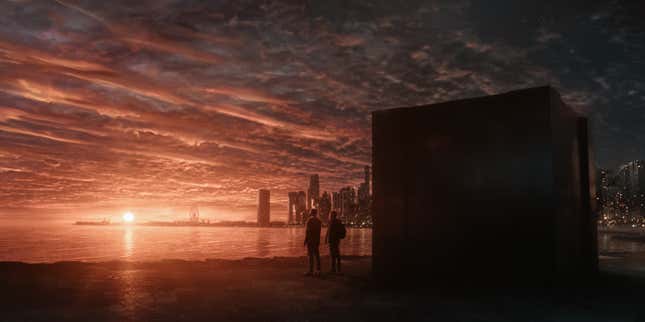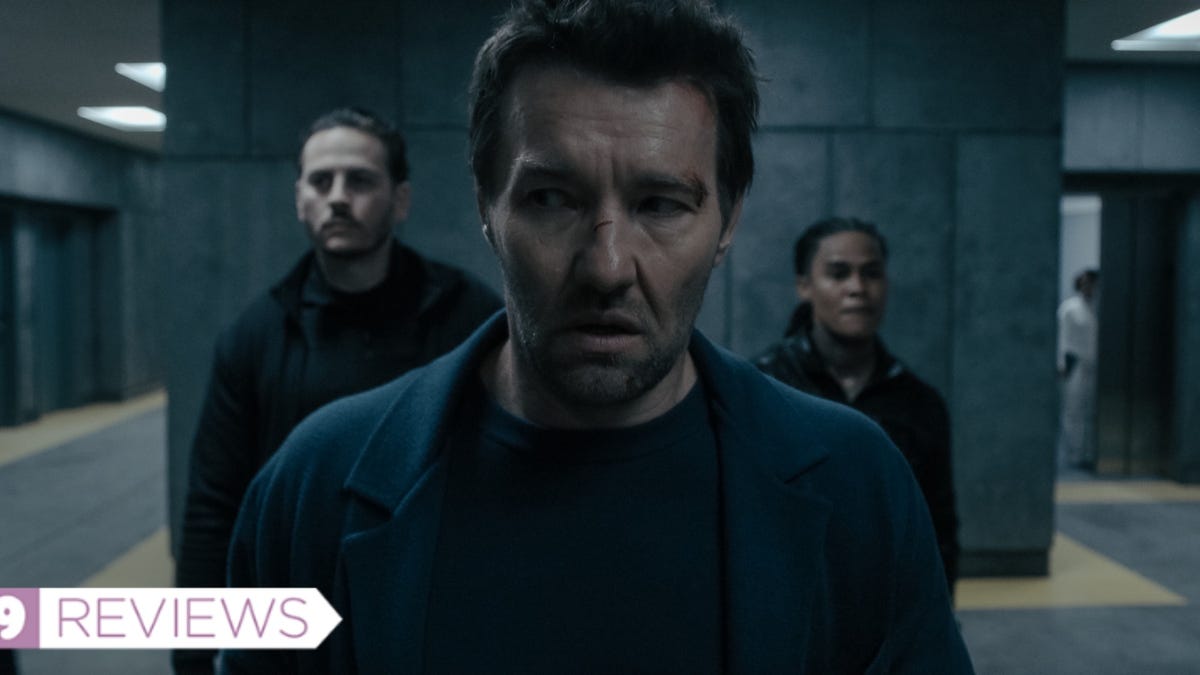A physics professor with a pretty great life—cool Chicago brownstone, cool wife, cool teenage son—is nonetheless bothered by a voice in his head that wonders what his life might have been, if he’d only he’d made different choices along the way. It’s something everyone has thought about, but in Dark Matter, that “what if?” scenario becomes vividly, often terrifyingly real.
Blake Crouch’s 2016 novel of the same name forms the basis of Apple TV+’s Dark Matter, and he’s very hand-on with the adaptation: showrunning, writing, and executive producing. So it’s not surprising that the nine-episode series is extremely faithful to the book, with just a few notable exceptions—chiefly involving characters who get fleshed out more on screen than they are on the page, resulting in a more well-rounded story. But mostly the focus remains on the protagonist, Jason, and the versions of his life that we witness as Dark Matter envelops us in its multiverse-hopping plot.
Casting Joel Edgerton was a wise move; he brings a likability and depth to Jason that wasn’t always apparent in the novel, and makes Jason much more sympathetic as a result. Edgerton does a phenomenal job calibrating his performance depending on which version of Jason he’s playing: the vaguely dissatisfied professor who’s still deeply in love with his wife, Daniela (Jennifer Connolly), and crazy about his son, Charlie (Oakes Fegley); or the alternate-reality Jason who never had a family and focused entirely on his work, a decision that’s made him a more ruthless, demanding person.

These two are not meant to cross paths. But Jason #2 channeled his genius into creating a large box that, when combined with a dose of a compound whipped up by Jason’s chemistry-whiz pal Ryan (Westworld’s Jimmi Simpson), allows a person to visit different versions of their world. (To be clear: it’s not a time-travel device, though it causes just as much trouble as those tend to do.) Jason #2, feeling his own mid-life regrets, enters the main Jason’s reality, kidnaps him and forces him back to Jason #2’s place of origin, then takes over Jason’s life. Circumstances soon mean that Jason re-enters the box with the help of Jason #2’s on-again, off-again girlfriend, Dr. Amanda Lucas (Alice Braga), determined to find his way home.
Dark Matter doesn’t linger too much on trying to explain exactly how the box works. The show is way more interested in the emotional and psychological ramifications that follow when a person is ripped from their reality, confronted with the impossible, and forced to negotiate strange filters on the familiar. At first, the worlds Jason and Amanda find are apocalyptic; they open the door to find Chicago’s been reduced to dust or decimated by climate change. As they work their way through their ampules of the brain-altering compound, they learn how to fine-tune their travels. Dark Matter is at its most thought-provoking when we visit worlds that are only slightly askew from Jason’s main reality, where the sign at Jason’s favorite bar is the wrong shade of neon, or Daniela’s hair is a different style. It’s fascinating to see how the characters, especially Daniela and Ryan, change ever so slightly—or a lot, depending on the diverging paths they took.

There’s a ticking-clock structure that prevents Dark Matter from feeling like a sprawling journey across universes; Jason and Amanda have a limited number of drug doses, for one thing. In Jason #2’s storyline, the urgency increases as Daniela begins to suspect something’s off with her husband, especially when Jason #2, the guy who decided he didn’t want to be tied down by a wife and baby 16 years ago, starts showing the callous streak he’s cultivated in the years since. Both Jasons may frequently be confused by their surroundings, but fortunately the audience rarely is; there’s a snapping sound whenever Dark Matter switches between narratives to keep the viewers on track, though you can also keep an eye on signifiers like Jason’s wedding ring (now worn by Jason #2, who stole it during the life-swap), or Jason’s facial lacerations (as seen on the main Jason, thanks to Jason #2).
While the nine episodes give Dark Matter room to really explore the philosophical questions at its core—it’s something that gets hammered in almost too forcefully, including in an alternate Daniela’s art show themed around “down the passage which we did not take/towards the door we never opened,” with the T.S. Eliot quote plainly spelled out—it almost feels like eight would have been enough, and would have kept the pace moving even faster. Though the plot keeps you guessing (unless you’ve read the book, though the series is enjoyable even if you know what’s coming), the show’s most fascinating element is Jason himself. This is mostly thanks to Edgerton’s performance, but also to nuanced writing that refuses to reduce Jason and Jason #2 to a good guy/bad guy dichotomy. They are the same man, shaped by their choices—some tiny, some huge, all life-altering. And as we watch them struggle, Dark Matter often seems to be turning the lens back on the audience, asking: if offered a peek at the road not taken… would you?

The first two episodes of Dark Matter premiere Wednesday, May 8, on Apple TV+, followed by a weekly roll-out of new episodes through June 26.
Want more io9 news? Check out when to expect the latest Marvel, Star Wars, and Star Trek releases, what’s next for the DC Universe on film and TV, and everything you need to know about the future of Doctor Who.

